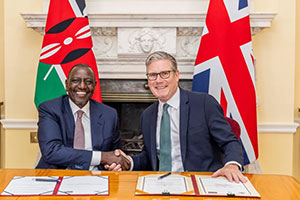
Posted on : Friday , 12th September 2025

President William Ruto supervised the signing of significant Memorandums of Understanding with three prominent British institutions - King's College London, the University of Nottingham and the Liverpool School of Tropical Medicine during his official visit to the UK. Kenya is celebrating a major diplomatic and economic milestone with these collaborations, which are worth millions of dollars and are intended to improve healthcare education, research and pharmaceutical production.
According to the agreements, the University of Nottingham and King's College London will join the Kenya-UK Health Alliance to create Centres of Health Education and Research Excellence throughout Kenya. These facilities seek to raise the bar for patient care, promote team-based research and enhance the calibre of medical education. Kenya sets itself up to become a regional centre for medical knowledge by making investments in research and education, drawing academics and professionals from all across East Africa and beyond.
The Memorandum of Understanding with the Liverpool School of Tropical Medicine, which will promote domestic pharmaceutical production at the state-owned BioVax Institute, is equally revolutionary. In order to boost domestic manufacturing, this cooperation will make use of the BRITE project, a concept that combines enterprise with research and innovation. This means Kenya can start producing necessary medications domestically, reducing dependency on imports and enhancing access to therapies that could save lives. Additionally, it promises to boost local employment and open up new doors in the pharmaceutical and biotech industries.
These collaborations have wider diplomatic significance. They show how Kenya has changed from a donor-recipient relationship to one based on common interests and knowledge. Kenya shows its confidence in its institutional competence and aspiration to lead, rather than follow, in determining its healthcare destiny by interacting with top-tier institutions on an equal basis. This collaboration is a demonstration of the UK's dedication to partnerships for sustainable development that actually affect the ground.
On a domestic level, President Ruto took advantage of the opportunity to showcase the ambitious health reforms implemented by his administration. mainly in major part to the restructured Social Health Insurance Fund (SHIF), the number of Kenyans with health insurance has increased from roughly seven million to twenty-four million in the last year. Contributions for higher-income earners have grown somewhat to the same amount under this approach, but contributions for vulnerable individuals have decreased significantly from 10 percent of income to 2.75 percent. With a more equitable and stable financial foundation, the change brings Kenya one step closer to universal health coverage backed mostly by domestic resources.
President Ruto made it obvious that he valued independence. He emphasised that the government will establish a system based on locally raised cash rather than relying mostly on donors to support health services. Policymakers have more authority over national health goals. Additionally, it increases Kenya's credibility internationally by proving that it is ready to fulfil its obligations and make investments in its own people.
President Ruto made his support for independence clear. He underlined that instead of primarily depending on donors to fund health care, the government will set up a system based on locally produced funds. National health goals are more within the control of policymakers. Furthermore, by demonstrating that it is prepared to meet its responsibilities and invest in its own citizens, it enhances Kenya's reputation abroad.
107,000 Community Health Promoters have been deployed nationwide, with approximately 8,000 of them in Nairobi alone, to support institutional improvements. These skilled professionals serve as a link between local populations and healthcare facilities, playing a vital role in early disease identification and preventive care. Their efforts guarantee that reforms result in tangible benefits for families throughout Kenya and lessen the strain on hospitals.
The agreements concluded and President Ruto's trip accomplished more than just strengthening Kenya's healthcare industry. They represent a change towards a contemporary, robust and equitable health system that is based on regional resources yet accessible to knowledge from around the world. The advantages for Kenya extend beyond improved medical care. Its position as a forward-thinking country prepared to take the lead in the region is further supported by improved diplomatic relations, an increase in domestic industry, and a reputation for creative health policy.
Expogroup is a full service exhibition organiser with over eighteen years experience in International.Trade Exhibitions and Events. Our current portfolio includes 20 annual exhibitions from a diverse range of industries being held across the Middle East & Africa.
EXPOGROUP © 1996 - 2025 | Privacy PolicyJoin our mailing list and receive latest news and advice from us in our monthly Newsletter
Yes, I would like to receive Expogroup E-newsletters
